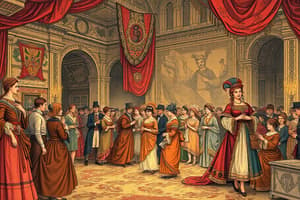Podcast
Questions and Answers
What was a significant cause of the French Revolution?
What was a significant cause of the French Revolution?
What was the purpose of the Declaration of the Rights of Man and of the Citizen?
What was the purpose of the Declaration of the Rights of Man and of the Citizen?
Which event is considered the symbolic start of the French Revolution?
Which event is considered the symbolic start of the French Revolution?
What characterized the Reign of Terror during the French Revolution?
What characterized the Reign of Terror during the French Revolution?
Signup and view all the answers
Which outcome marked the end of the French Revolution in 1799?
Which outcome marked the end of the French Revolution in 1799?
Signup and view all the answers
How did Enlightenment ideas contribute to the French Revolution?
How did Enlightenment ideas contribute to the French Revolution?
Signup and view all the answers
Which of the following best describes the Third Estate's situation prior to the revolution?
Which of the following best describes the Third Estate's situation prior to the revolution?
Signup and view all the answers
What was one important legacy of the French Revolution?
What was one important legacy of the French Revolution?
Signup and view all the answers
Which reforms were hindered by King Louis XVI's leadership during the French Revolution?
Which reforms were hindered by King Louis XVI's leadership during the French Revolution?
Signup and view all the answers
What key event took place when the Third Estate declared itself the National Assembly?
What key event took place when the Third Estate declared itself the National Assembly?
Signup and view all the answers
Study Notes
Overview
- Radical social and political change in France occurred from 1789 to 1799.
- The revolution marked the decline of absolute monarchy and the emergence of democracy and republicanism.
Causes
- Social Inequality: Society was divided into three estates: clergy, nobility, and commoners, exacerbating class tensions.
- Economic Hardship: Heavy national debt, poor agricultural yields, and taxation overwhelmingly burdened the Third Estate, leading to widespread discontent.
- Enlightenment Ideas: Intellectual movements advocating liberty, equality, and fraternity fueled revolutionary aspirations among the populace.
- Weak Leadership: King Louis XVI's indecisiveness and failure to implement meaningful reforms contributed to the crisis.
Key Events
- Estates-General (1789): Convened to respond to the financial crisis; the Third Estate took the decisive step of declaring itself the National Assembly.
- Tennis Court Oath (June 1789): Members of the National Assembly pledged to create a new constitution, symbolizing their commitment to reform.
- Storming of the Bastille (July 14, 1789): Considered a symbolic beginning of the revolution; the storming of this prison represented the uprising against oppression.
- Declaration of the Rights of Man and of the Citizen (August 1789): A foundational document proclaiming individual rights and democratic principles.
- Reign of Terror (1793-1794): A period of extreme political purging led by Maximilien Robespierre, characterized by mass executions of perceived adversaries of the revolution.
Outcomes
- Abolition of Monarchy: The monarchy was dismantled, leading to the establishment of the First French Republic in 1792.
- Rise of Napoleon: A coup d'état in 1799 paved the way for Napoleon Bonaparte's ascendance and the formation of the Consulate.
- Influence on Other Revolutions: The French Revolution inspired subsequent revolutionary movements across Europe and Latin America.
Legacy
- Established critical precedents for popular sovereignty and the recognition of human rights.
- Shifted power dynamics within France and significantly influenced global political ideologies.
- Initiated ongoing debates surrounding liberty, equality, and the role of government in society.
Studying That Suits You
Use AI to generate personalized quizzes and flashcards to suit your learning preferences.
Description
Explore the key factors that led to the French Revolution from 1789 to 1799, including social inequality, economic hardship, and the impact of Enlightenment ideas. Delve into significant events such as the Tennis Court Oath and the Storming of the Bastille that marked this transformative period in French history.




